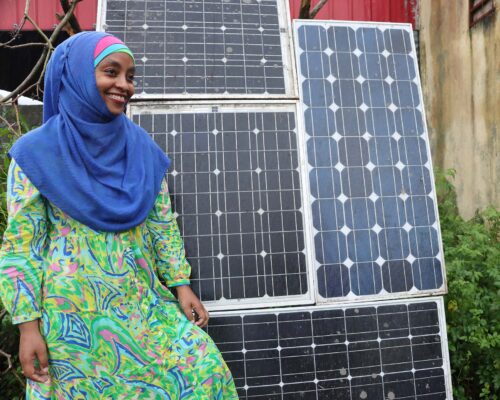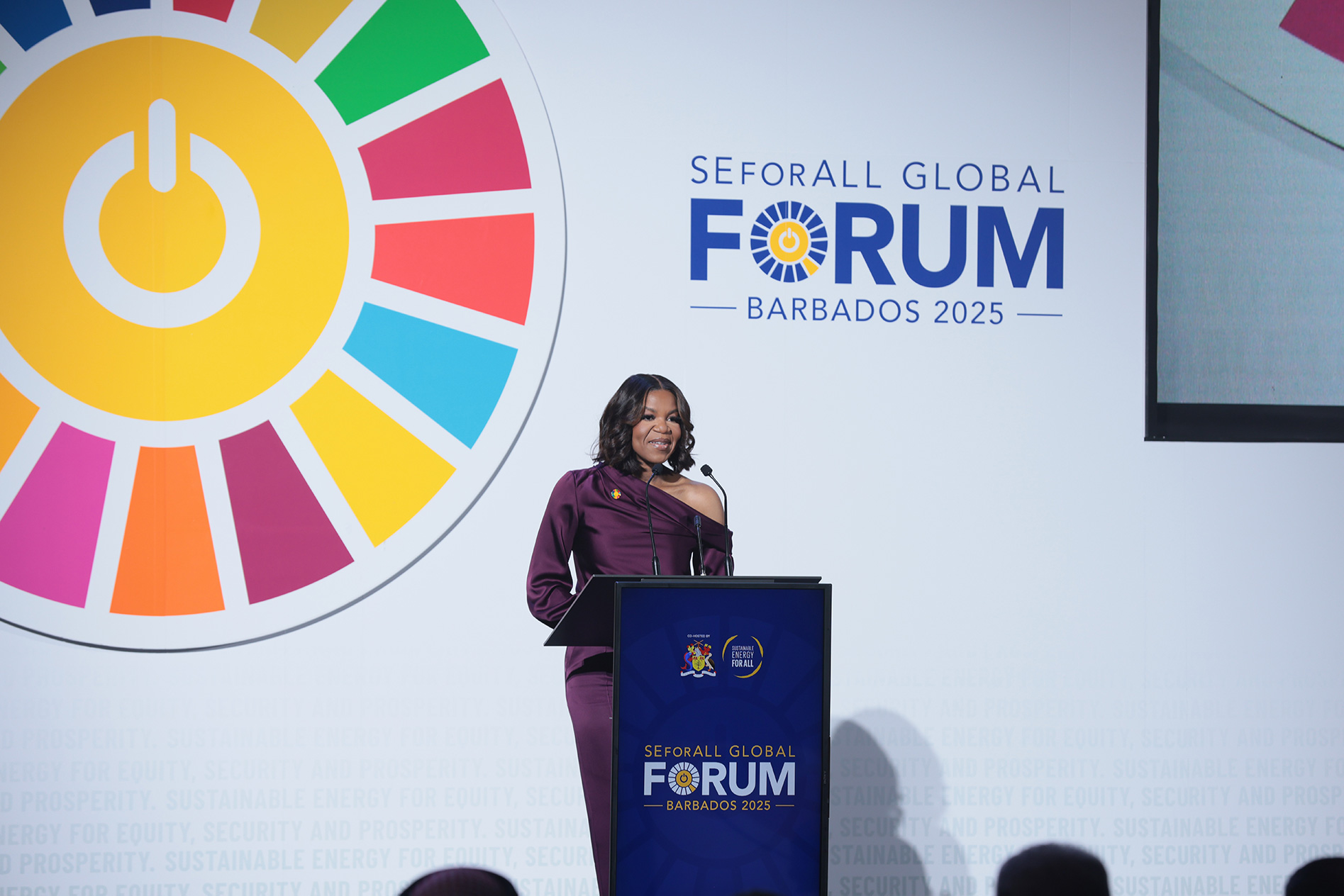
The Fast Track to Clean Energy: Building Women’s Leadership Capacity to Close the Gender Gap
RMI’s Energy Transition Academy (ETA) Global Women in Clean Energy Fellowship aims to catalyze a more inclusive and equitable clean energy workforce.
Additional contributors: Daniel Elkin Laurie Stone
On the global stage, leaders are recognizing the critical importance of engaging girls and women in achieving affordable and clean energy access for all, goal 7 of the UN Sustainable development Goals. “SDG 7 cannot be achieved without engaging girls and women,” Botswana’s minister of Youth and Gender Lesego Chombo stated at the inaugural SADC Sustainable Energy Week in February in Gabarone. This sentiment was echoed at this month’s Sustainable Energy for All (SEforALL) Global Forum in Barbados by SEforAll CEO Damilola Ogunbiyi when she said, “We can’t just start with gender and youth inclusion, we must build gender and youth into everything we do, creating a supportive system of women leading the energy transition.”

Damilola Ogunbiyi, CEO and Special Representative of the UN Secretary-General for Sustainable Energy for All and Co-Chair of UN-Energy, at the SEforAll Forum in Barbados, March 2025
Energy access is not merely a cornerstone of a sustainable energy future, it is a catalyst for social progress and inclusive economic development. Yet, millions across the Global South, particularly in Africa, still live without access to electricity. This persistent energy gap disproportionately affects women and girls.
Inspiring progress is none the less happening across the energy landscape. Utilities and governments are driving the advancement of grid-connected clean energy projects, while off-grid energy solutions are accelerating and transforming the way communities access reliable and affordable power. This is why RMI is proud to be an implementing partner of the Africa Minigrids Program (AMP), a technical assistance program leveraging solar-plus-battery minigrids to enhance economic development and improve livelihoods across 21 African countries.
Despite the rapid growth of the clean energy sector, the disparity in energy access is mirrored in the underrepresentation of women in the energy transition, especially in technical and decision-making roles. Women remain underrepresented in the industry, facing barriers to entry, career progression, and leadership opportunities. While significant efforts have been made to encourage more women into STEM fields, there is an equally pressing need for vocational training and leadership development tailored to women’s unique needs and realities. Research shows that when women are in leadership roles they drive more equitable and sustainable outcomes, accelerating the energy transition at the scale and pace required to meet global climate goals. In addition to fostering a community of practice and offering technical training opportunities, the AMP seeks to support and highlight women champions in minigrid development across Africa.
Understanding the barriers to gender equality
RMI is committed to empowering women leaders in the clean energy sector globally, recognizing that their leadership is critical to the rapid advancement of clean energy and sustainable development goals. To address the need for supporting and growing women’s leadership in minigrid development in Africa, RMI conducted a needs assessment involving 100 women representing more than 95 organizations working in clean energy across three AMP-participating countries: Nigeria, Ethiopia, and Zambia. These women, engaged through survey and in-depth conversations, represent a wide cross section of the energy ecosystem including nonprofit and multilateral organizations; women’s organizations; electricity distribution, generation, and transmission companies; renewable energy project developers; government; and financial institutions. The assessment also provided critical perspectives from women’s organizations and development institutions advancing gender equality in the energy sector in the region.
We adapted a framework developed in 2023 by talent advisory firm Shortlist that lays out the core drivers of gender inequality. Focusing on capacity building, our research identified five key drivers of gender inequity:
- Opportunity pipeline, including lack of awareness and role models, educational disparities, and lack of access to training and project funding resources
- Hiring, including bias during outreach and interviews
- Workplace, including unattractive job features and unsupportive environments
- Social norms and perceptions
- Policy gaps
These elements continue to hinder women’s participation by reinforcing gender stereotypes and biases that discourage women from entering or advancing in the energy sector.
There is little focus on encouraging girls in schools to consider engineering or energy careers, which limits the pipeline of talent.
Awareness campaigns targeting rural households, particularly women, are critical to bridging the gap in renewable energy knowledge.
It is a challenge to find female engineers — and they especially don’t want to be seen on the minigrid field. Engineers on site face most challenges such as missing amenities like toilets.
Progress and challenges for women’s empowerment in the clean energy space
Across the five areas illustrated in the framework, women highlighted progress and programs that have helped them thrive in their careers, including existing women’s organizations. Efforts to increase visibility for women in energy, such as events by the Ethiopian Women in Energy Network and Women in Renewable Energy, receive positive feedback and enthusiasm. “Seeing women leaders and champions, like Amina J. Mohammed, inspires others to follow their path,” one of the needs assessment participants said. “ENERGIA and the Global Women’s Network for the Energy Transition do a good job of creating visibility for women in the sector,” added another. In terms of project financing, collaborations such as the one between the AMP and local authorities such as the Eswatini Energy Regulatory Authority (ESERA) in Eswatini are subsidizing project costs, making electricity accessible, and empowering women with access to clean cooking, modern electricity, and economic opportunities.
At the same time, women reported difficulties in accessing technical training, networking opportunities, and mentorship opportunities, especially for those in rural areas. Inadequate work-life balance and access to critical enablers like daycare, continue to hinder women’s ability to take on leadership roles. Respondents from Zambia reported training gaps, fieldwork biases due to cultural reasons, and a stronger reliance on state-owned enterprises, which limits private-sector growth and opportunities for independent women entrepreneurs. In Nigeria, while corporate diversity is relatively stronger, cultural barriers persist especially in rural areas. In Ethiopia, state support is more structured, and gender policies are improving, but private-sector engagement and leadership development opportunities remain limited.
Bridging the gap: Equipping women with skills, training and leadership opportunities
When asked about what type of further support would be helpful, respondents highlighted the need for expanded mentorship opportunities and technical training, including minigrid and solar technology installation, distribution, and maintenance, and leadership trainings such as strategic decision-making, negotiation, and financial management. These trainings are reported to be most effective when hands-on and are financially sustainable long after completion. Networking opportunities also emerged as a key tool, ranking fourth among the most helpful tools needed to help women thrive.
As a junior, you don’t have confidence. With mentorship programs, you find your feet and speak with confidence.
To improve technical training programs, I would suggest incorporating more hands-on experience, partnerships with local industries for internships, and updated curriculum that reflects current technology trends. Additionally, introducing new offerings such as coding bootcamps, renewable energy training, and digital marketing courses could enhance the skill set of students.
To improve leadership training programs, I would like to see more hands-on experiences, such as internships or community service projects, that allow participants to practice leadership skills in real-world settings. Additionally, offering workshops on emotional intelligence and conflict resolution could enhance participants’ ability to lead effectively. New offerings could include mentorship programs pairing young leaders with experienced professionals, as well as online courses that cover diverse leadership styles and strategies.
RMI’s response: The Energy Transition Academy Global Women in Clean Energy Fellowship in sub-Saharan Africa
Closing the gender gap in the clean energy sector is not just a matter of equity — it is a strategic imperative for energy access, innovation, economic growth and a successful energy transition. Data from both our gender needs assessment in sub-Saharan Africa and our partner organizations point to the growing eagerness, enthusiasm, and demand for specialized technical training, mentorship, leadership, and networking opportunities to elevate women in clean energy across regions.
To address these needs, RMI’s Energy Transition Academy (ETA) is announcing a Global Women in Clean Energy Fellowship program in sub-Saharan Africa, beginning in Nigeria, Ethiopia, and Zambia, with the aim to expand over time. Leveraging the AMP network, this fellowship aims to catalyze a more inclusive and equitable clean energy workforce, ensuring that women are not just participants but leaders in shaping the future of energy by accelerating renewable energy projects. This initiative, developed in partnership with local African stakeholders and women’s organizations active in the region, will offer a comprehensive approach to capacity building.
The fellowship will include technical minigrid and integrated distributed energy resources project management training. It will also include mentorship and networking opportunities to create spaces for women to connect, collaborate, and learn from peers in the region and globally through RMI’s Women In Renewable Energy (WIRE) Network and RMI’s women in clean energy fellowship launching in Indonesia later this year. Additionally, the fellowship will feature a leadership accelerator with site visits to women-led renewable energy sites.
This program aims to amplify the leadership of women in clean energy and foster a supportive ecosystem among participating organizations across the sector.
We invite you to connect with us at eta@rmi.org to learn more about the program, stay up to date, and express your interest in participating or partnering.
Top image: Farida Ahmed Karim, AMP Comoros Project Manager, at a farm in Ivémbéni-Bandasamlini, Grande Comore, Comoros